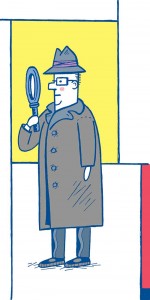 DI Stott was getting frustrated. He had no reason to suspect this older chap, but he just had a gut instinct that all was not as it should be. A couple of hours of intensive interviewing had produced nothing. It was time for something different. It was time to call Oscar.
DI Stott was getting frustrated. He had no reason to suspect this older chap, but he just had a gut instinct that all was not as it should be. A couple of hours of intensive interviewing had produced nothing. It was time for something different. It was time to call Oscar.
Seventy-two-year-old Albert Williams was a volunteer at Bashcombe House, a stately home in Surrey that housed a somewhat obscure art collection. It was best known (if known at all) for a painting by Mondrian called The Foxtrot on display in the dining room. Except now the home was best known for not having the painting.
Register now to continue reading
Thank you for visiting Optician Online. Register now to access up to 10 news and opinion articles a month.
Register
Already have an account? Sign in here

